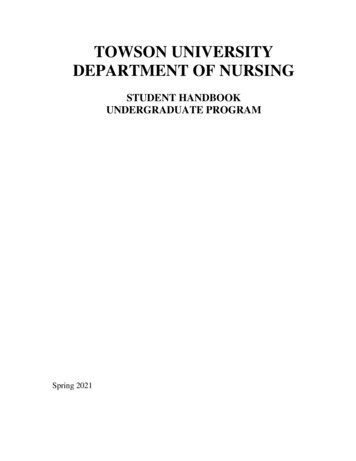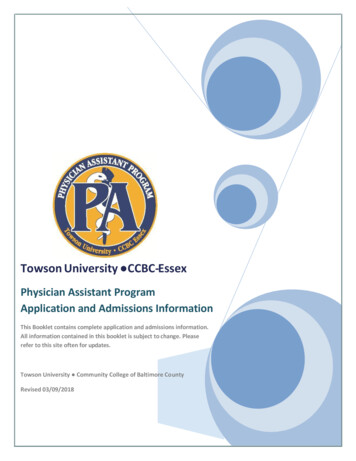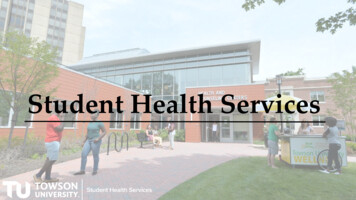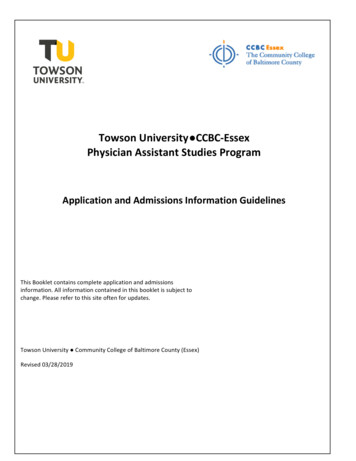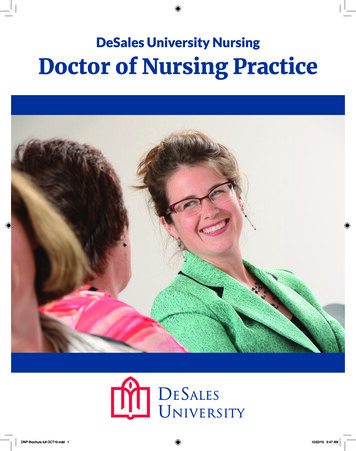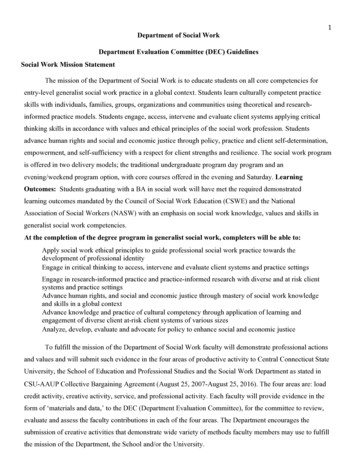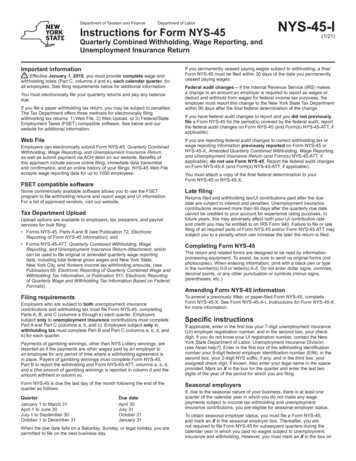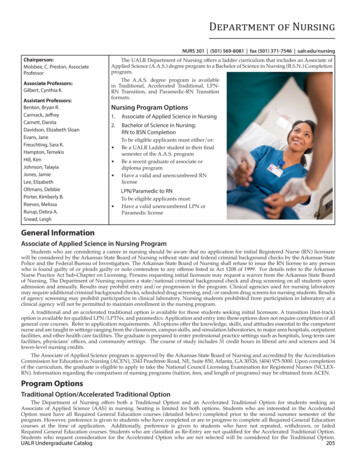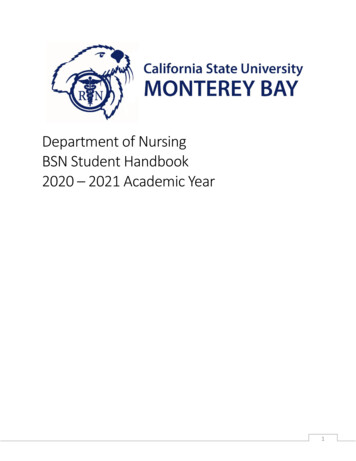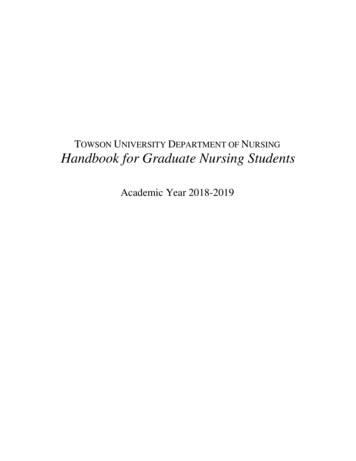
Transcription
TOWSON UNIVERSITY DEPARTMENT OF NURSINGHandbook for Graduate Nursing StudentsAcademic Year 2018-2019
IndexPreface .3General Information .4Nursing Faculty and Staff 5Department of Nursing Mission Statement .6Master of Science in Nursing . 7Program Information . .8Graduate Nursing ProgramOutcomes . .9Curriculum Outline . .10General Overview of Graduate Nursing Courses .12Degree Requirements 13Grading Scale .14Description of Graduate Nursing Courses .15Graduate Nursing Advising Sheet .18Policies .19Class Attendance/Absence Policy .19Graduate Nursing Student Policies . .20Health Policies and Procedures . 23Writing Style Requirements .25Evaluation of Student Work. . .26English Department Writing Services Information .27Honors and Scholarships . .28Sigma Theta Tau 28General Scholarship Information .29Graduate Assistantship Information .29Student Opportunities 29Resources . 30Blackboard .30Campus-Wide Resources .31Health Care Information .31Tutorial Help .31Advising and Counseling Services .312
PrefaceThe Faculty, Students and Staff of the Department of Nursing welcome you as youprogress toward the Master of Science degree with a major in Nursing or a Certificate in NursingEducation or Clinician to Administrator Transition. We hope that your experience in the graduateprogram in Nursing will be stimulating, challenging, and rewarding.This handbook contains information frequently requested by graduate nursing students.This publication is not intended to duplicate information available elsewhere, but rather,compliments the Graduate Catalog. Students need to be checking their Towson e-mail accountand the Graduate Blackboard site for announcements related to student issues and updates topolicies.Useful Websiteshttp://www.towson.edu/academics/graduate/ (Office of Graduate atalog.html (Graduate ing/grad/nursing/ (Information about earning aMaster of Science)http://www.towson.edu/nursing/graduate (Department of Nursing Graduate Programs)3
General InformationAddress:Department of NursingTowson University8000 York RoadLinthicum Hall, Room 301Towson, Maryland 21252-0001Telephone:410-704-2068Approval:Maryland Board of NursingAccreditation:Commission on Collegiate Nursing Educationwww.aacnnursing.org/CCNEMaster of Science, Major in NursingDegree Granted:Certificates Granted:Nursing EducationClinician to Administrator Transition (CAT)Administration:Hayley Mark, PhD, RN, FAANChairperson, Department of NursingPhone: (410) 704-3028E-mail: hmark@towson.eduKathy Ogle, PhD, RN, FNP-BC, CNEGraduate Program DirectorPhone: (410) 704-4389Email: kogle@towson.eduLorraine Armstrong, MSN, RNClinical Placement CoordinatorPhone: (410) 704- 6539Email: ljarmstrong@towson.edu4
Graduate Nursing Faculty and StaffGraduate FacultyDr. Hayley Mark, Department ChairpersonDr. Kathy Ogle, Graduate Program DirectorDr. Adriane BurgessDr. Vicky KentDr. Mary LashleyDr. Joanna S. MaxwellDr. Hyunjeong ParkDr. Mary GergisDr. Nikki AustinDr. Hee Jun KimDr. Briana SnyderDr. Regina TwiggLI 301ALI 301HLI 319LI 209LI 201CLI 201BLI 301DLI 201FLI 301FLI 201DLI 320LI StaffLorraine Armstrong, Clinical Placement CoordinatorMs. Toni TraceyMs. Nakida Hagans5LI 201EHagerstown CenterLI 301704-6539240-527-2757704-2069
Department of Nursing Towson UniversityMission StatementThe mission of Towson University’s Department of Nursing is to provide exceptional graduateand undergraduate education in a student-centered, caring environment to meet the diverse healthneeds of all populations. Graduates are prepared to practice in a rapidly changing health careenvironment using compassion, ethics, evidence-based care and inter-professional collaboration.Faculty promote integration of professional values and a commitment to life-long learning.Rev. 08.18.6
Master of Science in NursingThe focus of Towson’s master’s program is population-based nursing practice, with options foreducation or administrative roles. Population-based nursing is characterized by an orientation tothe individual, family, and aggregate population.A critical component of population-based nursing is the development of partnerships with clientsand an incorporation of culture and community. There is a focus on understanding and usingepidemiologic principles to effectively assess and care for all members of the community,including but not limited to vulnerable populations. It is treatment effectiveness and quality oflife, rather that the technologic imperative, which drives decisions.The intent of population-based nursing is to meet the needs of individuals, families andcommunities where they live, work and go to school and as they move across healthcare settings.It requires a higher level of autonomy, responsibility and accountability of the nurse at all levelsof care in various settings in the community.Components of population-based nursing include, but are not limited to, self-care, preventivehealth care, case management, continuity of care, collaborative care, and care within the contextof the family and the community. Population-based nursing focuses on how nurses practice, notwhere they work.Towson’s master’s program includes an option for students to complete an approved Clinician toAdministrator Transition (CAT) certificate program and to transfer those courses as a part of thenursing masters. Thus, students will have the opportunity to have an interdisciplinary, interprofessional learning experience that is imbedded in the framework of an accredited nursinggraduate program with a population-based focus.7
Program InformationThe Master of Science (MS) is a 36-credit program with a focus on population-based nursing. Studentscomplete a core group of classes (21 credits) and choose a concentration in Nursing Education or Clinicalto-Administration Transition (15 credits each). Each course is three credits, and there are two clinicalcourses that require eight hours weekly (can be individually scheduled with a preceptor). Each of theconcentrations may be completed for a post-baccalaureate certificate. The MS serves the needs of bothpart-time and full-time students by offering weekday courses at various times to allow professionals tobalance the demands of work and school. Nursing courses are often scheduled in the blended format withonline and face-to-face meetings.Nursing Education Concentration and Post-Baccalaureate Certificate in Nursing EducationThe overarching objective of the Nursing Education concentration is for students completing the programto acquire curriculum development, teaching and evaluation skills through a series of courses designed tofacilitate the transition of a clinician to an educator in an academic or health care setting. Theconcentration is an independent certificate program. However, students in the Post-BaccalaureateCertificate in Nursing Education program will study with students selecting the MS degree in Nursing,Nursing Education Concentration.Post-Baccalaureate Certificate in Clinician-Administrator Transition (CAT)The CAT certificate is designed for health care professionals who are interested in developingadministrative skills. The program focuses on the practical application of administrative theory andemphasizes leadership and skill development through a sequence designed to introduce concepts andfacilitate application of skills using case study, team teaching, information technology and other relevantmethodologies. Upon completion of the program, students will possess the knowledge and skills necessaryto provide excellence in leadership and day-to-day management in the delivery of health care services.Population-based Nursing FocusUnderstanding and using epidemiological principles to effectively assess and care for all members of thecommunity, including but not limited to vulnerable populations, underscores the philosophy of populationbased nursing. Treatment effectiveness and quality of life, rather than the technologic imperative, drivedecisions. The intent of population-based nursing is to meet the needs of individuals and families wherethey live, work and go to school and as they move across health care settings. It requires a higher level ofautonomy, responsibility and accountability of the nurse at all levels of care in various settings in thecommunity.Admission RequirementsTowson University requires that all classes be completed within seven years from the first semester ofenrollment. Applications are submitted on-line through the Graduate Admissions Officehttp://grad.towson.edu/applyNow/default.asp. For more information regarding admission requirements anddeadlines, please visit the ments/nursing/grad/nursing/admission.htmlWe look forward to seeing you at Towson! For further questions, please contact the Graduate ProgramDirectory, Dr. Kathy Ogle: kogle@towson.edu or 410-704-43898
Graduate Nursing Program OutcomesThe graduate of the Master of Science Program will be able to:1. Incorporate findings from the sciences and humanities to provide advanced nursing careacross diverse settings.2. Apply research outcomes within the advanced nursing setting to improve care, andresolve problems with an emphasis in population-based health.3. Function as part of an interdisciplinary team to improve health outcomes.4. Integrate the appropriate use of information technology in the delivery of advancednursing care for diverse populations.5. Apply advocacy skills to influence policies related to nursing and health care.6. Integrate theory, research, and practice into a population-based health project.7. Apply advanced nursing knowledge to a policy or political process.8. Demonstrate a leadership role in education and health care settings.9. Apply the concepts of continuous quality improvement to the delivery of advancednursing care and healthcare services.Rev: 08.189
Towson UniversityMaster of Science in NursingPopulation-Based HealthMaster’s Degree Core(15 Credits)NURS 601: Theoretical Foundations of Nursing Practice (3)NURS 603: Nursing Research (3)NURS 605: Nursing in Health Systems (3)HLTH 630: Epidemiology in Public Health Practice (3)Elective (3)Students select the Administrator or Educator role.Both roles are offered as independent certificates.Direct Care CoreEducator Role (15 Credits)Indirect Care CoreAdministrator Role (15 Credits)IDHP 600: Transitions: Health Professions in aChanging Environment (3)IDHP 605: Managing Health Care Professionals(3)IDHP 647: Management Planning andMarketing (3)IDHP 651: Health in Business and Industry (3)1.NURS 600: Advanced Clinical Practice (3)NURS 610: Curriculum Development inNursing (3)NURS 612: Teaching and Learning in Nursing(3)Prerequisites for:Prerequisites for:NURS 710: Evaluation in Nursing Education (3)NURS 810: Teaching Practicum (3)IDHP 610: Administration of Health CareOrganizations (3)Clinical Experience (6 Credits)NURS 701: Advanced Population-Based Health (3)Prequisites: All core and concentration courses with the exception of IDHP 610 (applies to Clinician toAdministrator students only, NURS 810 (applies only to Nursing Education students), and the elective course.Department permission required.NURS 802: Advanced Population-Based Practicum (3)Prerequisites: All core and concentration courses with the exception of IDHP 610 (applies to Clinician toAdministrator students only), NURS 810 (applies only to Nursing Education students), and the elective course.Department permission required.10
Towson UniversityCertificate in Nursing EducationDirect Care CoreEducator Role (15 Credits)NURS 600: Advanced Clinical Practice (3)NURS 610: Curriculum Development in Nursing (3)NURS 612: Teaching and Learning in Nursing (3)Prerequisites for:NURS 710: Evaluatin in Nursing Education (3)NURS 810: Teaching Practicum (3)11
Curriculum Overview for the M.S. Degree in NursingConcentrations:Nursing EducationClinician-Administrator Transition (CAT)Certificate Programs (15 credits):Nursing EducationClinician-Administrator Transition (CAT)Program Description:The Master of Science (MS) degree in Nursing is designed to prepare graduates to assume keyroles in the delivery of health care to individuals and families within a population-based nursingpractice. Concentrations are available in Nursing Education or Clinical-to-AdministrationTransition.A population-based nurse is a nurse who brings special knowledge of health promotion andprevention, and coordination of multiple systems and services to his or her practice setting in thecommunity. An individual and family-centered orientation, the development of partnerships withclients, and an appreciation of the values of the community characterize population-basednursing. Community settings are not limited, and specialization can focus on specific populationgroups. This degree is not a specialty in nursing, but a philosophy that guides care in all nursingspecialties. It does not prepare a nurse to sit for advanced practice certification, but does includeadvanced clinical content.All students are required to complete the Graduate Nursing Core. In addition, each student willselect a concentration for further study: Nursing Education or Clinician Administrator Transition(CAT). Students may elect to pursue a graduate project or thesis, if either activity is consistentwith their professional goals. The MS is designed for the student who has a bachelor’s degree inNursing from a regionally accredited program and is licensed as a Registered Nurse (RN), oreligible, in the State of Maryland or in a compact state.The MS also serves the needs of the full- or part-time student. Advanced practicum experienceswill be planned with appropriate agencies using a time frame congruent with the goals of theexperience and preceptor assignments.12
Degree RequirementsThe MS in nursing requires successful completion of a minimum of 36 credits. Fifteen of thesecredits will be determined by the concentration the student selects. All students will complete thegraduate nursing core.Graduate Nursing Core (21-27 credits)HLTH 630 Epidemiology in Public Health Practice (3)NURS 601 Theoretical Foundations of Nursing Practice (3)NURS 603 Nursing Research (3)NURS 605 Nursing in Health Care Systems (3)NURS 701 Advanced Population Based Health (3)NURS 802 Advanced Population Based Health Practicum (3)ElectiveGraduate course in any department (3)Concentration A: Nursing Education (15 credits)Students who desire to teach in a nursing school or work in staff development and education in ahealth care agency will complete the following courses. The certificate option may be selectedalone, or serve as a component of the master's program.NURS 600NURS 610NURS 612NURS 713NURS 810Advanced Clinical Practice (3)Curriculum Development in Nursing (3)Teaching and Learning in Nursing (3)Evaluation in Nursing Education (3)Teaching Practicum (3)Concentration B: Clinician-Administrator Transition (CAT) (15 credits) Studentsdesiring to emphasize administration can complete the CAT certificate program,including the following courses (15 credits):IDHP 600IDHP 605IDHP 610IDHP 647IDHP 651Transitions: Health Professionals in a Changing Environment (3)Managing Health Care Professionals (3)Administration of Health Care Organizations (3)Health Care Financial Management (3)Planning and Marketing Health in Business and Industry (3)The CAT concentration is either an interdisciplinary graduate certificate program offered by theCollege of Health Professions or a component of the master's program.13
Graduate Grading ScaleAll Graduate Nursing courses are graded on a /- scale. The quality points and letter gradeassigned to each number grade are listed below. Please see course syllabi for grading criteria forindividual courses and assignments.Letter GradeGPA EquivalentsNumericalA4.095-100A3.6790-94.9B 3.3385-89.9B3.0080-84.9C2.0070-79.9F0.00Below 69.9FX0.00Below 69.9A grade of FX is given to students who never attend class or who stop attending during the termwithout officially withdrawing.14
Course Descriptions Nursing(NURS)NURS 594 Travel Study in Nursing (3)Historical and contemporary sociopolitical factors that guide the delivery of health care tovarious population groups in other countries. Prerequisite: Permission of the instructor.NURS 600 Advanced Clinical Practice (3)Advanced Clinical Practice examines the advanced pathophysiology, physical assessment andpharmacological treatments for clients with or at risk for common health alterations.Prerequisite: department consent required.NURS 601 Theoretical Foundations of Nursing Practice (3)Prepares nurses to critically analyze and apply a wide range of nursing and related theories toresearch and clinical practice in order to develop a comprehensive and holistic approach to care.Prerequisite: department consent required.NURS 603 Nursing Research (3)Prepares the nurse to identify clinical problems, critically evaluate nursing research, develop aresearch design, and apply research in practice. Prerequisites: undergraduate research and/orstatistics course; department consent required.NURS 605 Nursing in Health Care Systems (3)Prepares the nurse to participate in the design, implementation and management of care in avariety of health care systems, provide quality cost-effective care, and assume a leadership rolein the managing of human, fiscal, and physical health care resources. Prerequisite: departmentconsent required.NURS 610 Curriculum Development in Nursing (3)Overview of theory and methods for the development of nursing educational delivery systems inacademic and service settings. Prerequisite: department consent required.NURS 612 Teaching and Learning in Nursing (3)Focuses on the application of learning theory and teaching methods in the classroom and clinicalenvironments with a particular emphasis on meeting the needs of diverse student populations.Includes instructional technology and micro-teaching experiences. Prerequisite: departmentconsent required.NURS 701 Advanced Population Based Health (3)Focuses on the application of advanced clinical reasoning to population-based health. Evidencebased program planning and evaluation models are applied to diverse population groups withunmet health needs across the lifespan. Emphasis is placed on the nursing care of the vulnerablepopulations in diverse community based settings. Prerequisites: all core and concentrationcourses with the exception of the elective course, IDHP 610 (applies to Clinician to15
Administrator students only) and NURS 810 (applies only to Nursing Education students);department consent required.NURS 713 Evaluation in Nursing Education (3)Emphasis is placed on the evaluation of student performance, teaching, courses and programs.Assessment measures of learner outcomes, faculty effectiveness and program quality will beexplored. Students who have successfully completed NURS 710 will not receive additionalcredit for NURS 713. Prerequisites: NURS 600, NURS 610, NURS 612, (may be takenconcurrently); departmen
The mission of Towson University’s Department of Nursing is to provide exceptional graduate and undergraduate education in a student-centered, caring environment to meet the diverse health needs of all populations. Graduates a
